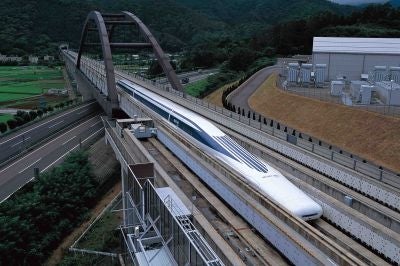Maglev to replace bullet train technology

One of the operators of Japan's famed "bullet trains" is planning to halve the time it presently takes to travel between Tokyo and Osaka with the introduction of a cutting-edge maglev vehicle.
Central Japan Railway Co. has unveiled a plan for magnetically levitated trains to travel the 438 km between the nation's two largest cities in just 67 minutes, down from the 138 minutes it takes the most advanced bullet trains today.
The new lines will cost Y8.44 trillion (€62.8 trillion) and the first stretch, between Tokyo and the city of Nagoya, could be operational by 2025, the company said.
"This is a project to give a dream to the public in the 21st century," Yoshiyuki Kasai, chairman of the company, told reporters when the project was announced.
The railway operator intends to start work on building the line in the early years of the next decade and will submit a proposal to the Land, Infrastructure, Transport and Tourism Ministry by the end of March.
Research on the new technology has been under way for several decades and JR has a test track in Yamanashi Prefecture, west of Tokyo, where a test train reached a speed of 581 kph in 2003. If the vehicle that goes into service is capable of those speeds, it will be the fastest passenger train in the world.
The vehicle has no wheels - doing away with friction and, hence, providing a smoother and quieter ride at a faster speed - and is propelled along a track through electromagnetic pull.
At present, a maglev train operates in Shanghai and another version was studied in 1994 to link Berlin and Hamburg, although that plan was scrapped because of the high construction costs and a lack of demand on the route.
JR Central, however, is confident that there will be sufficient demand for the service between Tokyo and Osaka, the industrial and financial hearts of the country.
The company also points out that bullet train technology will be 60 years old by 2025 - although it is constantly being enhanced and improved upon - while maglev technology is less polluting that flights that presently link the cities in the same travel time.
Subscribe to Independent Premium to bookmark this article
Want to bookmark your favourite articles and stories to read or reference later? Start your Independent Premium subscription today.

Join our commenting forum
Join thought-provoking conversations, follow other Independent readers and see their replies